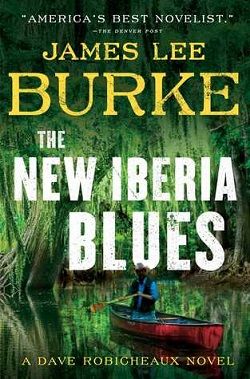James Lee Burke's The New Iberia Blues marks the twenty-second installment in the beloved Dave Robicheaux series, and it is a testament to Burke's enduring ability to weave intricate narratives that delve deep into the human psyche while exploring the rich tapestry of Louisiana's culture. This latest entry is no exception, as it combines elements of crime, personal struggle, and the haunting shadows of the past, all set against the backdrop of a vividly rendered New Iberia.
At the heart of the story is Detective Dave Robicheaux, a character who has become synonymous with moral complexity and existential inquiry. Burke masterfully reintroduces Robicheaux's world, which is often filled with darkness and despair, yet is punctuated by moments of beauty and redemption. The narrative kicks off with the discovery of a young woman's body, crucified and left to be found, a gruesome tableau that sets the stage for a gripping investigation. This shocking event serves as a catalyst for Robicheaux to confront not only the external forces at play but also the internal demons that have haunted him throughout his life.
The character of Desmond Cormier, a former street kid turned Hollywood director, adds layers to the narrative. Initially introduced as a success story, Cormier's character is soon shrouded in suspicion as Robicheaux seeks answers. Burke's ability to craft multifaceted characters is evident here; Cormier is not merely a plot device but a reflection of the complexities of ambition and the moral compromises that often accompany it. The juxtaposition of Cormier's glamorous life against the grim reality of the murder investigation serves to highlight the theme of duality that runs throughout the book.
Another significant character is Antoine Butterworth, Cormier's enigmatic actor friend. Butterworth embodies the allure and danger of fame, and his interactions with Robicheaux reveal the often murky waters of loyalty and betrayal. Burke's dialogue is sharp and insightful, capturing the nuances of human relationships and the often unspoken tensions that lie beneath the surface. The dynamic between Robicheaux and these characters is rich with subtext, as they navigate a world where trust is a rare commodity.
As the investigation unfolds, Robicheaux is joined by his trusted ally, Clete Purcel, and his daughter, Alafair. Their presence not only provides emotional grounding for Robicheaux but also serves to illuminate the theme of familial bonds in the face of adversity. Burke's portrayal of these relationships is poignant, showcasing the love and loyalty that persist even amidst chaos. Alafair, in particular, represents a glimmer of hope for Robicheaux, a reminder of the possibility of redemption and the importance of connection.
The novel's pacing is expertly crafted, with Burke balancing moments of intense action with reflective interludes that allow readers to ponder the deeper implications of the narrative. The tension escalates as Robicheaux and his team delve deeper into the criminal underbelly of New Iberia, encountering the mob and the deranged Chester Wimple. Burke's ability to create a palpable sense of danger is enhanced by his vivid descriptions of the Louisiana landscape, which almost becomes a character in its own right. The swamps, bayous, and historic towns serve as a haunting backdrop that mirrors the turmoil within Robicheaux's soul.
One of the most compelling aspects of The New Iberia Blues is its exploration of the theme of light versus darkness. Robicheaux's journey is not just a physical one; it is also a spiritual quest as he grapples with his past and the choices he has made. Burke's prose is lyrical and evocative, often delving into philosophical musings that elevate the narrative beyond a mere crime thriller. The struggle between good and evil, the search for meaning in a chaotic world, and the quest for personal redemption are all woven into the fabric of the story, making it a profound reading experience.
Burke's writing style remains as engaging as ever, with rich imagery and a keen sense of place that immerses readers in the world he has created. His ability to blend lyrical prose with gritty realism is one of the hallmarks of his work, and it is on full display in this novel. The dialogue crackles with authenticity, and the characters' voices are distinct and memorable, making it easy for readers to become invested in their fates.
In comparison to other works in the crime fiction genre, Burke's storytelling stands out for its depth and emotional resonance. While many authors focus solely on plot mechanics, Burke's narratives are imbued with a sense of humanity that elevates them. Readers who appreciate the works of authors like Michael Connelly or Dennis Lehane will find much to admire in Burke's intricate plotting and character development.
Ultimately, The New Iberia Blues is a powerful exploration of the human condition, a meditation on the choices we make and the ghosts we carry. It is a testament to Burke's skill as a storyteller and his ability to create a world that is both familiar and hauntingly strange. As Robicheaux confronts the darkness that surrounds him, readers are invited to reflect on their own struggles and the light that can emerge from the shadows.
In conclusion, James Lee Burke's latest installment in the Dave Robicheaux series is a must-read for fans of literary crime fiction. With its rich character development, thematic depth, and evocative prose, The New Iberia Blues is not just a story about solving a murder; it is a profound exploration of life, love, and the enduring quest for redemption.
























Reviews 0
Post a Reviews: